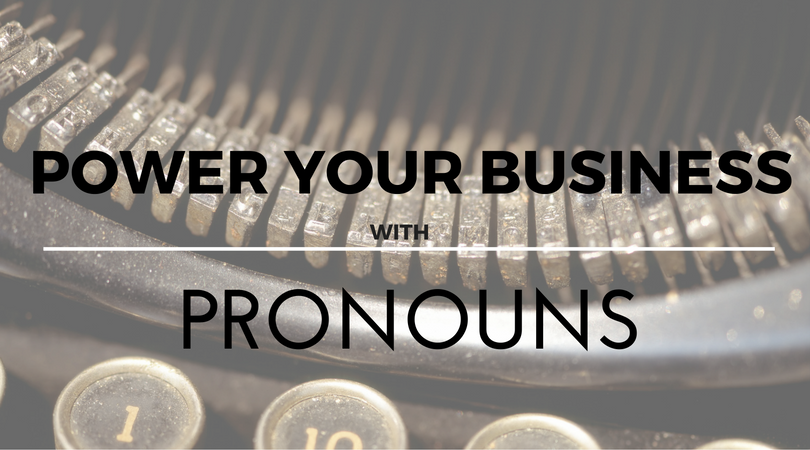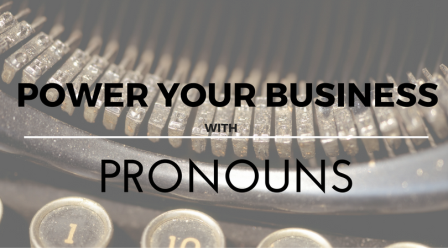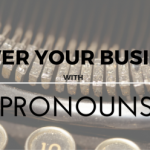Power Your Business With Pronouns
— November 29, 2016

It takes just seconds. Visit any website and you will see statements such as, “We are experts in……”, or “Our products are the best because……” Both may be true, but as a potential buyer, I frankly don’t care. It’s a non-starter, a minimum expectation, that the organizations I choose to deal with are all going to be experts and leaders in their particular space. What I really want to know is how their products or services are going to help me!
Organizations, like individuals, enjoy talking about themselves. It is a trap that is all too easy to fall into. The prevailing logic is that organizations need to “sell” potential customers on their expertise, quality, points of difference. But, people don’t want to be sold. They want to be heard, they want to know that their needs are understood.
Simple changes can be made by any organization to signal its customers that they do in fact hear them and understand their needs and wants. It starts with the language that is used. Organizations need to resist the over-use of “Our” and “We”. Instead, whenever possible, those should be replaced with more empathic language.
Let me offer a simple example. Suppose that you are considering purchasing your first widget. A friend says, “Hey check out Wide World of Widgets.”, so you go to their website.
On their website, you find the following statement. “At World Wide Widgets, we make the very best widgets. Our proprietary state of the art process ensures that our widgets will deliver reliable results. We pride ourselves on outperforming our competitors. Click here to place an order.”
Simple, powerful and bold statements, but isn’t that what you’d expect? I doubt you’d be placing an order with a company that touts the mediocrity of their product. Yet, the more important question is, does this language actually help you to decide if you should even buy a widget?
Now, let’s try a more empathic approach. Let’s say the next website you visit is World Wide Widgets largest competitor, Widget World. On their landing page, you’re met with text that reads, “Widgets designed to make your life better. Each day you face many challenges. The right widget, tailored to your specific needs, can really make a difference. We’d like to help you determine which widget is best for you. Click here to tell us more about yourself.”
Obviously, for illustration purposes I’ve made the difference between the landing pages of World Wide Widgets and Widget World pretty dramatic. In reality, the application of this empathic approach is quite nuanced. There are times that an organization needs to explain differences in a product or service, to tout a benefit or make an offer. But, it needs to be done in a way that speaks to how it will solve a challenge or meet a need of its intended user.
It is a tough habit to break. We’ve been conditioned to market and sell goods and services by focusing on features and benefits. In the past, that worked. It doesn’t anymore. In my opinion, there is no perfect recipe. There are, however, some simple steps that can be taken. In any customer facing communication, look out for the over-use of first person plural pronouns. Whether the landing page of a website, a marketing brochure of even an email, they should all be dominated by second person pronouns. So, less “We” and “Us” and more “You”.
The other thing that can be done, is to write from behind the eyes of the intended user. In other words, if you are about to send an email to a customer, write as if it were an email you’d find of value and want to receive. It’s not about crafting the perfect message. Rather, it’s about proving that you understand its receiver.
Organizations go to great lengths to stand apart from their competition. They invest in innovation and marketing. They work to improve the customer experience and hire the best sales teams. But, the real opportunity to create a point of difference may simply be in the pronouns you use and the empathy you show.
Business & Finance Articles on Business 2 Community
(7)













